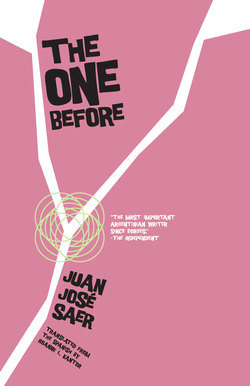Читать книгу The One Before - Juan José Saer - Страница 12
На сайте Литреса книга снята с продажи.
ОглавлениеRegarding a Literary Argument
We began nice and early in the morning. When, seven hours later, we were still arguing after having eaten lunch, something in the room was different, and I’m not talking about the light that had changed over time, or about the cigarette smoke, or about the notes or abstract doodles which now sullied papers that once were white. Arguments at the height of summer! I know what I’m talking about, but the more I try, the less able I am to say it. It’s a state of the world so uncertain and banal that no one has ever invented a term to adequately describe it. Perhaps nothing really is happening and I, purely out of vertigo, have set about trying to pin down some unnamable thing in the very center of nothingness. But let’s just say that something happened: not the smoke, nor the papers, nor the light, nor the tables, nor the people, nor the themes up for discussion were the same as they had been at nine in the morning. Baroque variants: there was never any morning, or rather, this moment stands alone, the word “was” is only real when it is said (you might say it’s nothing more than a sound), and now there is nothing more than the great wide space where everything is clear, as I see it now, freshly sprouted and swarming, what we call the present.
Well directed, a single example can serve to suggest diversity, even infinity. We, members of a cultural commission, discussed the possibility of updating and disseminating, for the public benefit of the city, a classic work—Cervantes, let’s say. We split up the basic ideas of Don Quijote, a product of fundamental facts. First, to order it historically, is the great envelope into which we were born and which we call the world, one of whose parts is the general opinion that Don Quijote is a masterpiece. (Another of its parts is Don Quijote, naturally.) The second fact is our reading of Don Quijote. I like to compare this reading to the times I spent hours playing with a mirror, making the sunlight bounce off of its smooth surface, filling up the room with mobile stains of light and dazzling glimmers. Seven hours after we began, the two suppositions have gotten so far away from our immediate experience that, without suggesting that they have been erased, I would venture to say that their relation to our debate is the same as the foundation of a house to its architectural style and the arrangement of its rooms; it sustains them, but no one sees it, and no one has ever seen it besides the engineers who constructed it. At the mouth of the tunnel of warm weather that has passed since this morning, what the world knows about Cervantes and Don Quijote is now filled in, densely, opaquely, no less arid than the arid walls our voices echoed against, nor less compact than the words that fall continually from our brains to our mouths and raise continually from the air to our minds. And once again I begin to feel that something is changing, without knowing what, without knowing how to express it, or knowing if it is even really changing, without knowing if I am able or if it would be worthwhile to say so, if it is true that it has really changed. With just one step one could pass from this state of strangeness into horror. From here the possibility of writing a new classic is almost nil: that’s why I said an argument on the edge of summer.
